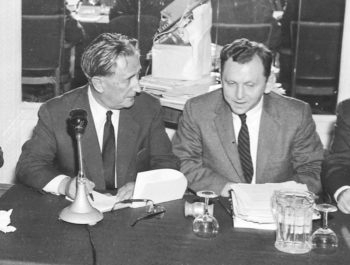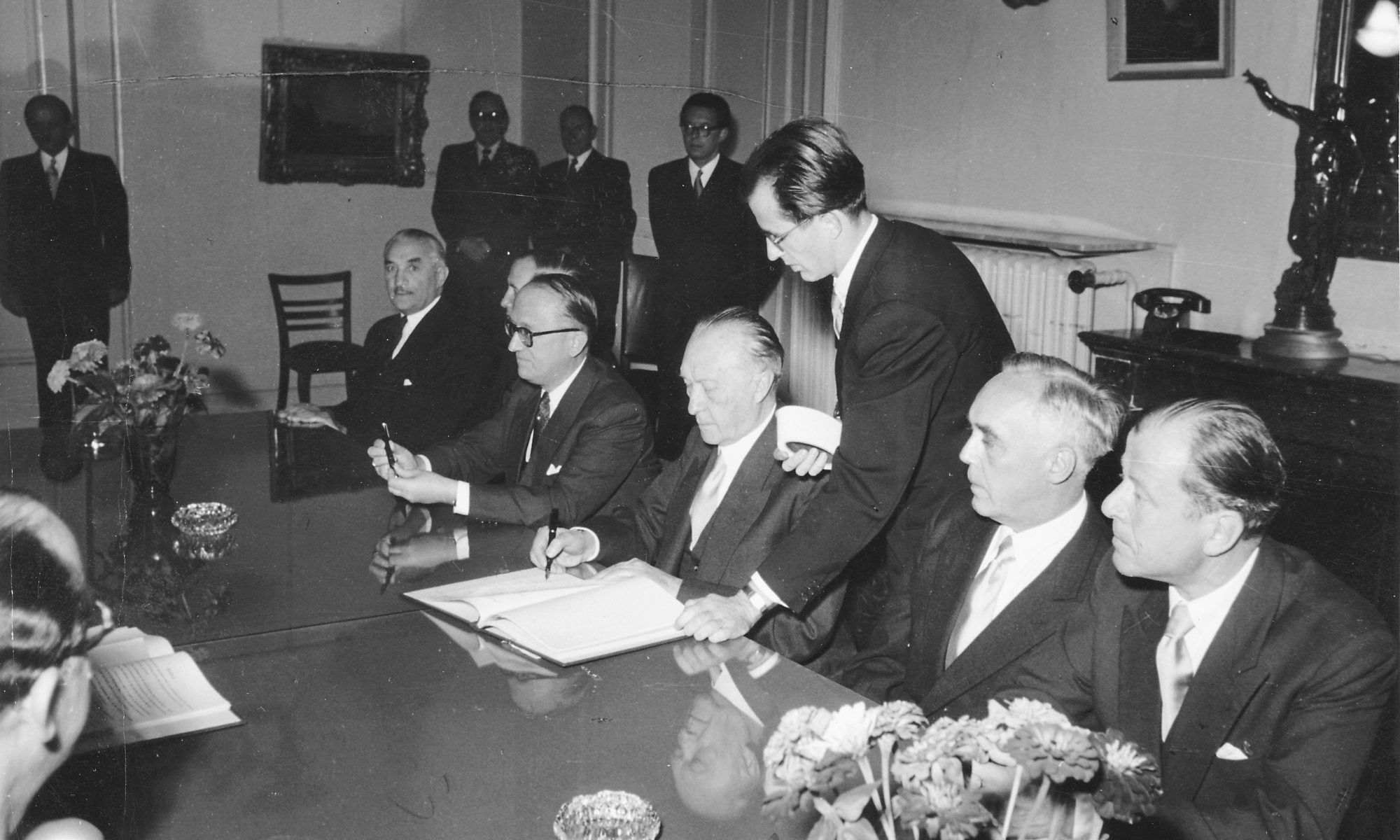
Saul Kagan, founding executive director of the Claims Conference, right, talking to Nahum Goldmann, founder and longtime president of the World Jewish Congress, 1958.
(Courtesy Claims Conference)
NEW YORK (JTA) — As the founding executive director of the Conference on Jewish Material Claims Against Germany, I remember just how difficult the issue of negotiating with Germany was within the Jewish world 60 years ago. In Israel in particular, it was a subject of enormous controversy, political and moral. Yet as far as we in the negotiating delegation were concerned, we did not come just to seek financial help to assist the victims of the Shoah.
For the first time in the history of the Jewish people, we came forward to advance legal and moral claims on the country that had perpetrated crimes against us, in this case the successor state to the Third Reich.
For the Jewish people, persecuted and homeless for two millennia, this was indeed a unique moment in its history.
Our organization was formed in 1951 following a landmark speech by West German Chancellor Konrad Adenauer that signaled Germany’s readiness to address the responsibility for the acts of the Nazi regime. We chose our group’s name very deliberately. We wanted to ensure recognition that although material claims could be addressed, the moral claims of the survivors and indeed the entire Jewish people could never be resolved.
Negotiations among representatives of the Claims Conference, the State of Israel and West Germany began in March 1952. For these talks, the Dutch government gave us an old medieval castle called the Oudkasteel at the edge of The Hague.
Two anti-Nazis headed the German delegation: Franz Bohm, a Frankfurt University professor of civil law whom American forces had freed from a Gestapo jail, and lawyer Otto Koester, who had been a leader of the Protestant Resistance to the Nazis.
There were no handshakes, no banter that first day. The atmosphere was official and chilly. We somehow had the feeling that we were not alone in this room; somehow we felt that the spirits of those who could not be there were with us.
After that very solemn start, the talks engendered a proper working relationship in personal contact and discussions. The German delegation would meet mornings with the Israeli delegation and afternoons with Claims Conference representatives. The Claims Conference and Israeli representatives would meet at the end of each day and coordinate positions.
Among the three groups we created a foundation of friendly and civilized human relationships. We worked throughout the spring and summer, and you don’t spend all those months together, night and day, without developing a normal rapport and relationships.
At times we were deadlocked. Nachum Goldmann, representing the Claims Conference, would fly to Germany to meet with Adenauer and the two would resolve the dilemma.
For six months we wrestled with trying to create the basis both for compensation and for the principle of a small measure of justice that had to be the underpinning for all the efforts. Clearly we never believed that we could attain any sort of true justice, so any sort of payments, no matter the amount, would always be symbolic in nature.
In September 1952 we signed the agreements by which West Germany promised to enact legislation that would provide individual compensation to Holocaust survivors, provide funds to the Claims Conference to help Holocaust survivors outside of Israel rebuild their lives, and provide funds to the State of Israel.
Signed in Luxembourg by Adenauer, Goldmann and Foreign Minister Moshe Sharett on behalf of Israel, the agreements laid the foundation for the ensuing 60 years of seeking a small measure of justice for Jewish victims of Nazi persecution. The agreement was for $821 million. Since then, Germany has paid $70 billion in compensation to Jewish victims of Nazism.
Adenauer and Goldmann remained in touch, periodically vacationing together in Switzerland.
From 1952 onward, the Claims Conference has worked with every German government to press its demands and to ensure that the commitment that the German government had undertaken in Luxembourg would not remain paper on the shelf of an archive.
After six decades of continuous, intense efforts to fulfill, expand and implement the basic principles that are contained in the Luxembourg Agreements, we should mark them. We don’t celebrate necessarily. We mark them, properly and appropriately.
When I look back now and think about being present at negotiations and the signing of the Luxembourg documents, I think not about writing history but about learning from experience to continue to energize our efforts going forward.
At the Claims Conference, we knew at all times that there cannot be full indemnification for the personal sufferings of the survivors. We also knew there was no way that the material losses could be fully compensated. So we had to focus on the optimum that could be attained while continuing to pursue expansions. We have done this now for 60 years. But our mission and our responsibility are by no means finished.
They must continue for generations and generations to come because above and beyond our efforts to advance the demands of the survivors, there are lessons that have to be carried forward, beyond the Jewish world, in the hope that the more the world will learn what the Holocaust was all about, and how just prejudice can turn into hate and land in the crematoria of Auschwitz, the better it will be not only for the Jewish people but for the world at large.
So we must continue.
(Saul Kagan was the founding executive director of the Claims Conference and served as the organization’s professional leader for 47 years. He remains a special consultant.)
JTA has documented Jewish history in real-time for over a century. Keep our journalism strong by joining us in supporting independent, award-winning reporting.






